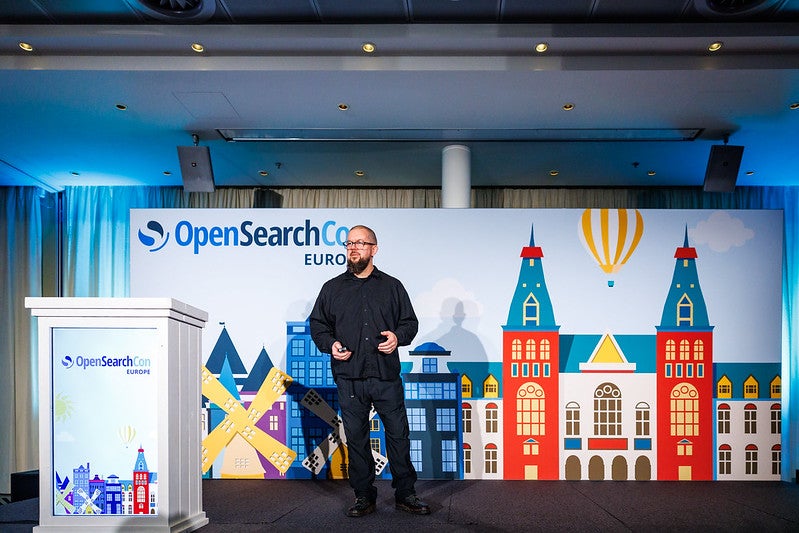
This blog provides an overview of the OpenSearch User Group program and some observations I shared as part of a keynote presentation at this year’s OpenSearchCon Europe.
The OpenSearch Project has grown exponentially since its inception, and a key driver of this growth has been the vibrant, global community that supports it. One of the most exciting developments for our community has been the rise of OpenSearch User Groups – local communities where enthusiasts, developers, and professionals gather to share knowledge, collaborate, and foster innovation. This topic is near and dear to me as I’ve been working closely with the community to support our User Groups since the program began.
The birth of a community movement
The idea for OpenSearch User Groups gained momentum after the first OpenSearchCon in 2022. The event brought together users, contributors, and advocates, sparking a crucial question: When could I get something like this in my region? The community wanted more in-person interaction, and I kept thinking, how can we solve this together?
The answer became obvious: Local user groups.
But starting a global program isn’t as simple as flipping a switch. It requires:
- Critical mass – A dedicated group of people passionate about OpenSearch.
- Sustainability – A framework that ensures longevity.
- Resources – Time, tools, and leadership to keep things moving.
As I said in my keynote: “It takes a village.”
What makes a successful user group?
1. Strong Leadership
A thriving user group starts with a leader who:
- Has a passion for growing the community.
- Is an inclusive communicator and facilitator.
- Is trustworthy and responsible.
We’re very fortunate to be able to say there are so many examples of this across the globe within the OpenSearch community!
2. A flexible yet structured framework
To ensure consistency across groups, OpenSearch provides a scalable framework, including:
- A suggested meeting cadence.
- Topic guidelines (e.g., demos, case studies, best practices).
- A Code of Conduct to foster inclusivity.
- Meeting Format to help organizers understand flow for their events.
The framework is available on GitHub for transparency and collaboration: github.com/opensearch-project/community/tree/main/user-groups and is meant to provide enough of a structure to set each group up for success while remaining flexible for each local community.
3. Branding & identity
Each group carries the OpenSearch Project name followed by their city (e.g., OpenSearch Project – Chicago). I’ll even work with local leaders to add their own flair—whether it’s city skylines, unique themes, or regional colors—to make the group feel authentic.
This has brought up some unique designs; our Tokyo group chose a purple motif for their group to reflect the color’s significance in their culture.
4. Tools for connection
To help users find and engage with these groups, OpenSearch uses:
- Meetup.com for event organization.
- Slack channels for real-time discussions and finding local speakers.
- Social media & forums for broader outreach.
Each time I’ve gone to an event around the world, someone has walked up to me and told me they were there because they had looked through Meetup for something new to learn that week. Meetup has been a great awareness builder for the program.
5. You
Whether you want to speak at an upcoming meeting, or, just come to learn more, the User Groups are only successful if the community wants to get involved and stay involved.
Why get involved?
For individuals
- Active learning: Dive deep into OpenSearch through discussions and hands-on sessions.
- Networking: Connect with like-minded professionals and expand career opportunities.
- Community building: Play a role in shaping the future of OpenSearch.
For businesses & solution providers
- Validate ideas: Test new use cases with real users.
- Expand reach: Engage with audiences beyond traditional circles.
- Build trust: Position your brand as a thought leader in the OpenSearch ecosystem.
Global success stories
OpenSearch User Groups have already taken root in 12 countries, including:
- Europe: Dublin, London, Paris, Milan, Berlin, Amsterdam
- North America: New York, Chicago, Vancouver, Seattle, Austin, San Francisco
- Asia: Seoul, Tokyo, Pune
- Middle East: Tel Aviv-Yafo
and we’ve added even more since the keynote!
Join the movement
The OpenSearch community is stronger when we collaborate. Whether you’re a developer, a business leader, or just curious about search and analytics, there’s a place for you in a local user group.
Ready to start or join a group? Visit opensearch.org/user-groups and be part of the conversation! Reach out to me on the #user-groups channel on Slack.
By fostering local connections, OpenSearch User Groups are helping to build a global community one city at a time. 🚀
